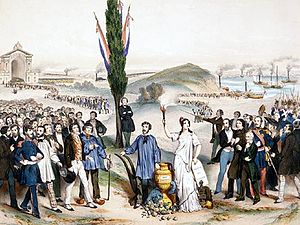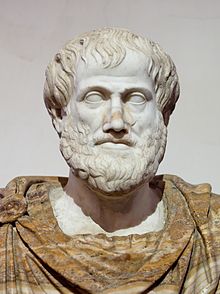Our South Neighbor
GREEK “DEMOCRACY” BROUGHT TO LIGHT
Translated by Vesna Stevkovska
Motive: Why the Greeks refuse entrance to our well-known and acknowledged citizens
One of the greatest Christian commandments states: “Love your
neighbour as you love yourself.” However, this commandment did
not apply to the time of Philip and Alexander of Macedon.
Unfortunately, ever since then, antagonism between the
Macedonians and Greeks has been at a very high level. Thus,
both, hate and love, faith and battle, submission and
cooperation, and evil thoughts towards one’s neighbour and all
he possesses, continued to grow among both Christian peoples -
the Greek and the Macedonians. Part of this truth is still
present even now, and many varieties of the neighbour’s life
sometimes influence the future of co-existence, while other
times they throw a dark light upon these paths and turn them
into labyrinths.

Let us start at the beginning. It is a fact that at the moment Aegean Macedonia encompasses a large part of southern Macedonia and that within it, the national composition of the population has undergone huge ethnic changes, especially after the Balkan wars and the partitioning of Macedonia. Macedonians under Greek rule were, and still are subjected to assimilatory tortures and forced emigration, with the sole aim of changing the ethnic composition of Macedonia. This is done for the reason that the Macedonian people, according to its characteristics and customs, linguistically and ethnically, differs from the Greek.
For this reason, from the very first moment when the Greek bourgeoisie spread its power over Aegean Macedonia, it established a policy of physical extermination of the Macedonian people and changing the ethnologic composition to its own advantage. Thus, with the intention of erasing every possible trace that reminds of the Macedonian character of Aegean Macedonia, the Greek bourgeoisie adopted a law in November of 1926 to give Greek names to the villages and cities, mountains, fields, toponyms, rivers, and so on. Later, during the time of the Civil War in Greece, during the period 1946-1949, they continued with the exodus of many Macedonians and members of the Greek communist party. As early as then, Macedonians were considered as potentially disloyal toward the Greek state. Therefore, on 1 October, 1947 a decree was adopted for taking away the right to citizenship, which was followed by steps for their expelling from Greece.
 It is also a fact that during the Civil War in Greece,
approximately 30,000 children aged between 2 and 14 years, the
majority of which Macedonians, were driven out to Yugoslavia and
other Eastern European countries. At the time, more than 50,000
Macedonians were forced to emigrate due to the difficult and
harsh reprisals to which members of the Macedonian national
minority were subjected. More than 17,000 died. It is also a
fact that on 23 August, 1953 a decree was adopted to colonize
the border regions with “new colonists which have a healthy
national conscience.” Therefore, Greeks settled in places from
which Macedonians had emigrated. The same decree meant that
numerous Macedonians, refugees from Greece, were deprived a
Greek citizenship and their properties confiscated.
It is also a fact that during the Civil War in Greece,
approximately 30,000 children aged between 2 and 14 years, the
majority of which Macedonians, were driven out to Yugoslavia and
other Eastern European countries. At the time, more than 50,000
Macedonians were forced to emigrate due to the difficult and
harsh reprisals to which members of the Macedonian national
minority were subjected. More than 17,000 died. It is also a
fact that on 23 August, 1953 a decree was adopted to colonize
the border regions with “new colonists which have a healthy
national conscience.” Therefore, Greeks settled in places from
which Macedonians had emigrated. The same decree meant that
numerous Macedonians, refugees from Greece, were deprived a
Greek citizenship and their properties confiscated.
In 1959 the Greek government adopted a law which predicted compulsory statements of loyalty. Hence, the Greek authorities demanded that the population in the villages surrounding Lerin (now Florina) and Kostur (now Kastoria) confirm publicly that they do not speak the Macedonian language. Such measures were also taken towards emigrants from Aegean Macedonia in Australia and Canada. In addition to this, in 1967 there was an interesting order that forbid the use of the Macedonian language, which was an act of taking away their citizenship, as well as other measures for assimilation of the Macedonians.
It is also a fact that assimilation of the Macedonians by the Greek authorities continues to take place even now, through the system of education, the inability to find employment in any state institution for those who declare as Macedonians, and through an entire new series of laws and regulations which are discriminatory as regards the Macedonian national minority. For instance, we will emphasize the decision of 1982 as regards the repatriation of Greek citizens and political refugees, which allowed only “Greeks by birth” to return to Greece, i.e. those who will give up their Macedonian identity and adopt Greek names. The law of 1985 also contains a discriminatory clause which prevents Macedonians in the Republic of Greece from attaining the right to ownership of property. To top it all, in 1986 the Greek government dropped the “St. Cyril and Methodius” university in Skopje off the list of foreign academic institutions whose diplomas are acknowledged in Greece with the explanation that lectures at this university were in a language that was not “internationally recognised.”
This shows that the official negation of the existence of the Macedonian national minority remained constantly in Greek policy, regardless of the government that was in power.
In more recent times, Greek policy is once again turned against members of the Macedonian national minority. Some of the recidivism of Greek “democracy” continues to be evident. This was confirmed by the odyssey in registering the Macedonian cultural society in Lerin i.e. the non-profit association “Home of Macedonian Civilization” centred in Lerin, whose goal was allegedly to promote ideas on the presence of a Macedonian national minority in Greece, which was in contradiction to Greek laws and national interests. The Greeks believe that the association disturbs the territorial integrity of the country and that there are no grounds in its objectives for a “cultural, intellectual, and artistic development of its members and the population of Lerin, nor for development and progress of the national culture.”
Furthermore, it is also a fact that the Republic of Greece refused to recognise the Republic of Macedonia under its constitutional name with the explanation that the use of the name shows its territorial aspirations toward parts of Greek Macedonia. Pressuring the Republic of Macedonia, Greece imposed an unofficial severe trading blockade in the autumn of 1992 by closing its border to Macedonia in February 1994 with the aim of inflicting economic damage, degrading the infrastructure, and throwing its northern neighbour, the Republic of Macedonia “on its knees.”
This Greek policy toward the Republic of Macedonia with diverse diplomatic activities slowed down the process of its international recognition, and contributed toward the precedent of its being accepted in the United Nations under a temporary name. And Greece is strong because it is a member of the European Union. However, it forgets that it is not nationally homogeneous, but is in fact a multi-national country bearing all of the potential political consequences; it needs to accept European regulations regarding the treatment of minorities and protection of their human and cultural rights; it is a country from which the word “democracy” originates; it is a country with wide commercial, cultural, and other potentials; alongside with Macedonia it is the land of the past, with the hope that it will also be the land of the future; and finally, it is a neighbour of the Republic of Macedonia, who should be the right hand to a better tomorrow.
We must emphasise here that the Macedonian and Greek people, regardless of their policy, have always collaborated in good times and bad times. This has been confirmed in recent decades with the increasing collaboration between the two countries and their people in cultural and other fields. In this respect, numerous translations from Macedonian to Greek and vice-versa have been published, and there has been great collaboration between folk entertainment groups, theatrical and other associations. A large number of Greek intellectuals condemn the political injustice inflicted upon well-known and recognized Macedonian citizens who descend from Aegean Macedonia. We must also emphasize the significance of the Greek Helsinki Committee and other associations protecting human and other rights of every citizen in the Republic of Greece.
Greece’s signing of the Council of Europe Convention for Protection of National Minorities of September 1997, showed good signs of gradual positive changes in the attitude toward the minorities in Greece. This convention will probably lead to the disappearance of the reasons for Greek denial of the name of the Republic of Macedonia and the rights of the Macedonian minority in Greece.
It is yet another fact that in most recent times Greece by far leads before all other foreign investors who have invested their capital in Macedonia. Thus, the participation of Greek companies in more than fifty investment projects amounting over 230 million dollars represents, on the one hand, a powerful potential and recovery, and on the other hand it means economic dependence of Macedonian economy on Greek investors. Good economic relations between the Republic of Macedonia and the Republic of Greece continue providing expectations that collaboration and investment policy of both countries will continue in future, with the belief that this time the past will not repeat itself, nor the sentence of the scholar Virgil: “Trust not the horse, O Trojans. Be it what it may, I fear the Grecians even when they offer gifts.”